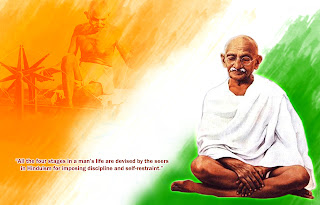Business in the 21st Century seeking Sustainability - Relevance of Gandhian model on TRUSTEESHIP
I have been watching the debate around “the case against CSR” with interest. The fundamental point where we
all seem to get stuck is around “the role of business.” Economists and many
CEOs argue that the role of business is to maximize shareholder profits,
whereas the CSR community talks about contribution to society for the greater
good.
I believe that the essential problem about the
role of business cannot be resolved within our current framework of thinking
unless we add another element – “The element of Trusteeship.”
The TATA group of companies is based around
this principle. Trusteeship is the model of responsibility that best describes
the group founder – JRD Tata’s view of himself and his role in the world. It
was a view that JRD essentially derived from Gandhi. Gandhi talked frequently
about the role of business as being that of a trustee or a steward for what you
hold. Gandhi’s view of trusteeship was based on the belief that we do not
really ‘own’ our wealth but are only trustees of it, meaning that we have
to administer our wealth for the benefit and betterment of the community. In
the trusteeship model, wealth does not automatically go to the family members
but only to those who can function as its trustees. Thus, this idea of
trusteeship challenged the fundamental principles of a capitalist society. JRD
adopted this framework and implemented it in a practical way within the TATA
ethos.
Some of the key tenets of trusteeship that I
believe are applicable today are:
1. Surplus Wealth needs to be kept in trust for
the common good and the welfare of others.
2. To fully adapt the concept of trusteeship a
non violent approach needs to be adopted.
3. Everything that we do must be economically
viable as well as ethical at the same time making sure that we build
sustainable livelihoods for all.
4. Economic equality through trusteeship will
thus ensure an equitable distribution of wealth amongst all.
5. Absolute trusteeship is unattainable – but if
people behave as trustees then we can develop institutions that are
economically viable, yet benign.
Not many rued the demise of this concept in
the 50s and 60s and this view had more or less been shelved for the latter half
of the 20th century. However, this concept is making a steady comeback as
economic collapse, absence of values and challenges of sustainable growth face
the world today.
While there are many aspects to trusteeship in
its ideal Gandhian form, the fundamental concept of trusteeship is about equity
and sustainable growth. When viewed from this lens, a Trusteeship approach puts
emphasis on reconfiguring social and business structures so that people feel
both individually empowered and inclined to act in the common interest.
(Ref – India of my dreams – Gandhi)
My view is that if CSR departments and
organizations could be designed around this unique principle of Trusteeship,
most of the debate around the role of business would get resolved.
In the debate around CSR, Professor Karnani
and others argue that CSR implies a deviation from the core objectives of a
business. This is valid from the perspective that businesses have largely seen
themselves as distinct from society and as hubs of production and distribution.
However, the world around us is seeing some
fundamental changes and senior executives in most companies are aware of these.
According to the UN Global Compact CEO study, 93% of the CEOs believe that
sustainability will be a key issue in defining the future of their business.
Many of them are rightfully concerned because a shortage of key natural
resources is looming on the horizon. In addition, the move from a constantly
upwards moving graph that typified the 20th century company is now changing
towards a circular structure involving cradle to cradle(zero waste) production.
The same UN Global
Compact report goes on to say that many CEOs believe that businesses will now
have to move beyond profit as a measure of value, to metrics that take
non-financial aspects into account – putting a new onus on the ability to
measure progress.
If we examine the role of business in this
context and apply the principles of Trusteeship to today’s corporations we can
devise a new way of integrating social responsibility within the DNA of the
business. This will ensure that our companies no longer need to set up CSR
departments to showcase our efforts, instead CSR will be built into everything
we do.
The Gandhian perspective is more relevant
today than it was ever before. Gandhi wanted to ensure distributive justice by
ensuring that business acts as a trustee to its many stakeholders and specified
that economic activities cannot be separated from other activities. Economics
is part of the way of life which is related to collective values.
Gandhi said, “True economics stands for social
justice, it promotes the good of all equally including the weakest and is
indispensable for a decent life.” This has implications at the macro economic
level as well as at the micro level, as it talks of equitable distribution of
wealth being a measure of success, rather than the current form which has high
income disparities. It also builds the case for CSR being embedded within the
business values of the private sector as Gandhi clearly states that
distribution of wealth is not about charity but about ensuring basic human
dignity.
Inherent in this philosophy are entrenched
solutions to many of the challenges of the 21st century:
1. Sustainable consumption – consume what is
enough for your needs without doing harm to others.
2. Utilization of natural resources in a
sustainable way – you are a trustee and you need to take care of what has been
freely provided by nature.
3. Dignity of labour and equitable distribution
of wealth – wealth alone is not the answer, to feel happy you need to ensure
that the people who work for you and society at large is taken care of.
4. Sustainable livelihoods – and not charity –
are a key to ensuring human dignity, growth and satisfaction.
So today, while we all
agree with the concept of improving stakeholder value, let’s redefine value to
incorporate much more than profit. It is in this context that the 21st century
corporation should see itself.
(The ref data is as shared by Namrata Rana)




Comments
Post a Comment